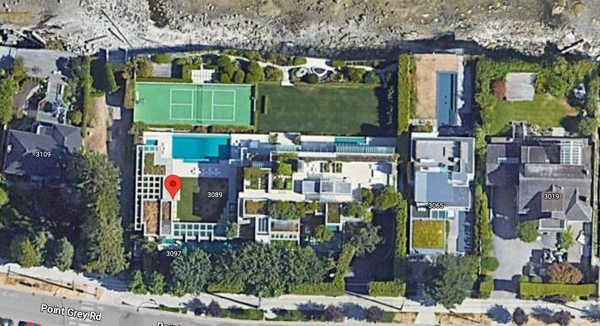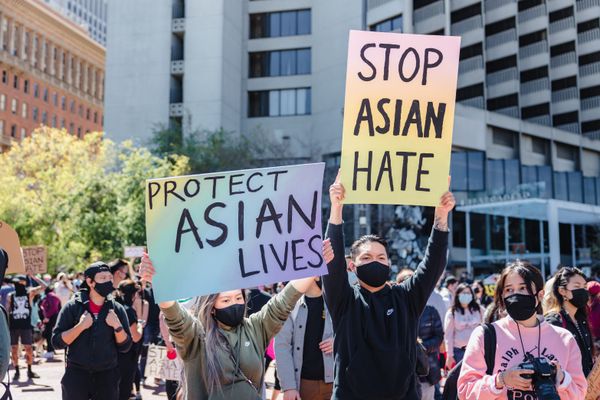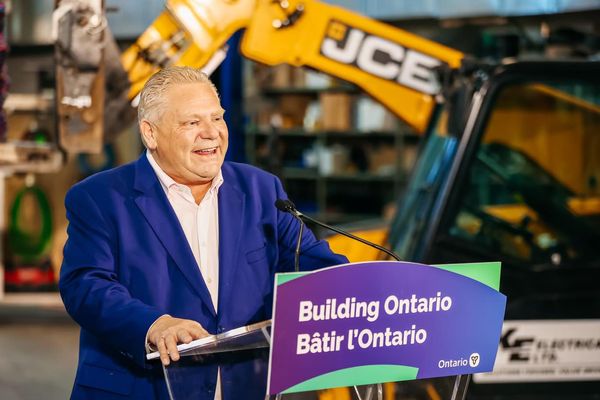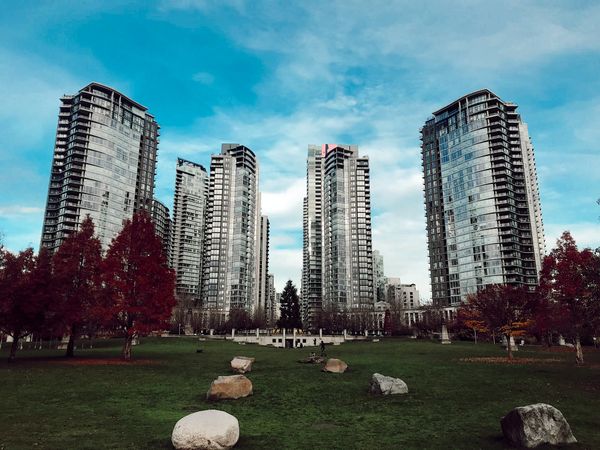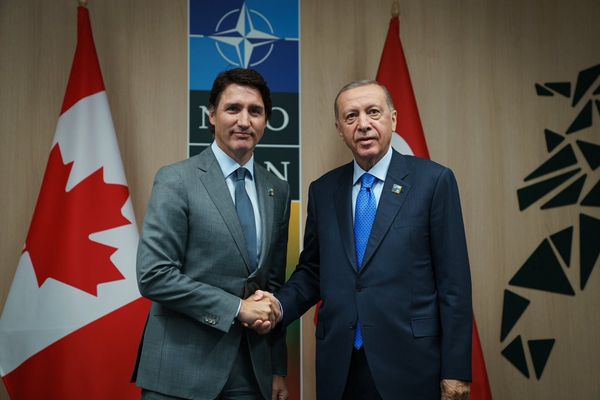Good morning. Last night, federal party leaders Justin Trudeau (Liberal), Erin O’Toole (Conservative), Jagmeet Singh (NDP), Francois Blanchet (Bloc) and Annamie Paul (Green) took part in the second French language leaders’ debate in Gatineau, Quebec.
You can watch CBC’s full-stream with English translation here. Here are some highlights.
On The Snap Election Call
The first round of questions concerned Justin Trudeau’s decision to send Canadians to the polls early. As reported by The Maple, the early election call raised concerns about low working-class voter participation, while others have said the gamble could backfire against Trudeau as Canadians question the need for an early election.
The leaders were asked whether they would commit to seeing the next Parliament through for a full four-year term without triggering an early election.
- Trudeau said people deserve a choice in selecting the next government to oversee the recovery from the pandemic, but did not directly address the question.
- O’Toole said he would “absolutely” commit to not calling a snap election if his party forms the next government.
- Singh said the NDP did not want an early election and that he is committed to working together with other parties, but did not say if his party would commit to keeping the next government in power in a minority Parliament situation.
- Blanchet said the Bloc would do everything it can to keep the next government alive.
- Paul said the Greens would also do everything they can to work together with other parties and keep the next government standing.
Long-Term Care
Party leaders were quizzed about their positions on long-term care. A study in March found that deaths in long-term care homes accounted for 69 per cent of all Canada’s COVID-19 fatalities — the worst record among wealthy nations.
In particular, COVID-19 outbreaks were deadlier in for-profit long-term care homes than public or non-profit homes, according to a study published by the Canadian Medical Association Journal last year.
Here’s what the party leaders said about the issue:
- O’Toole stressed his party’s commitment to increasing provincial health transfers, while emphasizing his support for Canada’s public healthcare system.
- Paul noted that her father died in a long-term care home during the pandemic second wave, and said radical reform of the system is needed, along with national standards to be legislated under the Canada Health Act.
- Blanchet said provinces are the ones with the expertise required for setting public health standards.
- Singh said Canada’s record in long-term care homes during the pandemic has been a national shame, and stressed his party’s commitment to eliminating for-profit care homes.
- Trudeau said hardships faced by seniors began before the pandemic, and that his government has worked to improve funding and conditions for healthcare workers.
Vaccines
Currently, 68 per cent of Canada’s population is fully vaccinated. In an effort to boost vaccination rates, some provinces — including Manitoba, Quebec, British Columbia and Ontario — have committed to introducing vaccine passports, which require individuals to prove their vaccination status in order to enter a wide range of public spaces.
The issue has been a heated one on the federal election campaign trail. This week, Trudeau and two others were pelted with gravel by an angry mob of far-right anti-vaccine protesters in London, Ontario — the latest in a series of Liberal campaign events to be disrupted by such demonstrations.
All the major parties have required their candidates to be vaccinated, with the exception of the Conservatives. Early in the campaign, O’Toole said unvaccinated Tory candidates must present daily COVID-19 tests, although it is unclear how strictly that requirement is being enforced.
Here’s what party leaders said about vaccines during the debate:
- Paul decried the politicization of COVID-19 vaccines, saying her party is in favour of mass vaccination, but said accommodations must be made for those who are unable to get the shot.
- Singh said there should be consequences for those who refuse vaccines, but said solutions need to be prioritized for helping people get the shot.
- Trudeau said there is no debate about the safety and efficacy of vaccination, and made a distinction between far-right mobs of hardline anti-vaccine protesters versus those who are hesitant or unsure about receiving the shot.
- O’Toole stressed the need for people to get vaccinated, but spoke against “dividing people.” Trudeau accused O’Toole of conflating COVID-19 tests and vaccines.
- Paul talked about the need to be bold and ambitious coming out of the pandemic in response to a question about the fact that her party’s platform is not yet costed.
During the same segment, O’Toole was asked directly about whether or not he supports a two-tier health system, in which wealthier individuals are able to access better quality health services through private providers, while lower-income people are provided only with basic, government-funded coverage. O’Toole referred to provincial jurisdiction, and stressed that he respects the authority of the Quebec government.
O’Toole was asked if he supports more private healthcare, but the Conservative leader again dodged the question, and said he supports Canada’s public health system. O’Toole has repeatedly come under fire from the Liberal Party for his comments supporting private involvement in public health during the election campaign.
The Climate Emergency
The issue of the climate emergency featured prominently in the debate, with party leaders slamming Trudeau on his climate record, as Canada was the only G7 country whose greenhouse gas emissions increased between 2015 and 2019. The federal government under Trudeau also gave $18 billion in federal subsidies to the oil and gas sector in 2020.
O’Toole has also struggled with the issue, as in March his party voted against passing a resolution that recognized “climate change is real” by a margin of 54 per cent to 46. The Conservative Party’s plan to introduce a green rewards program, meanwhile, has been panned by experts as being woefully out of touch with today’s climate science.
- Trudeau called his climate plan “ambitious,” and emphasized his party’s pledge to put a cap on emissions in the oil and gas industry. The Liberal leader also said that under his party’s plan, all cars in Canada will be electric by 2030.
- O’Toole said the issue of climate change is important to him, and that Canada needs to meet its Paris emissions-reduction targets. O’Toole said the Tories’ plan will reduce emissions while also creating jobs.
- Paul said her party is the only choice this election for combatting the climate emergency.
- Singh said he is afraid for his child’s future because of climate change, and noted the Liberals’ have missed climate targets. He said his party will eliminate fossil fuel subsidies, and pledged a “brighter future” for youth.
- O’Toole claimed it is possible to reduce emissions while also creating new jobs in the oil and gas sector.
- Trudeau claimed Canada’s role as an oil-producing nation can be reconciled with reduction targets, and said a climate transition cannot happen “overnight.”
- Singh said Trudeau has had six years to make meaningful changes to address the climate emergency.
- Paul noted her party is the only one committing to halting the construction of new oil and gas infrastructure, including cancelling the Trans Mountain pipeline expansion project (TMX). She said the future for Canada is renewable energy.
- Singh agreed, saying there must be investments in renewable energy, and said Canada cannot afford four more years of Trudeau. He also emphasized the NDP’s plan to help municipalities fund greener public transit systems.
- Trudeau claimed his party’s climate plan has the backing of “experts.”
- Paul said former B.C. Green Party leader Andrew Weaver was “wrong” to endorse the Liberal Party’s climate plan, and said the federal Greens are the only ones proposing a plan ambitious enough to substantially reduce greenhouse-gas emissions.
- Asked how voters can trust Trudeau, given his party’s climate record, the Liberal leader said his party is on track to meet targets, and said people need to know they have a government that will act ambitiously, and slammed O’Toole for wanting to go back to former Conservative prime minister Stephen Harper’s emissions-reduction targets.
- Singh said both Trudeau and O’Toole will miss emission-reduction targets.
- Blanchet called the current targets “cowardly,” and said Canada is not even prepared to go as far as the U.S. in reducing its emissions.
- Paul said Canada has a “historic” opportunity to be a global leader in developing a green economy, and appealed to voters to vote for a “new direction.”
Trans Mountain Pipeline
- Singh said he is against TMX, but dodged a question about whether he would actually cancel it.
- Trudeau said some Indigneous peoples are invested in TMX, but would not give a timeline on how long the project would remain operational. Similarly, O’Toole provided no timeline for TMX’s operation under his watch, saying Western Canadian families deserve a living.
Indigenous Peoples
- Asked if party leaders would commit to including Indigenous languages as official languages, Blanchet said yes, the federal government must do that. Trudeau said his government has worked with Indigenous peoples to work on official status for Indigenous languages. Singh said he completely agrees that the feds must recognize Indigneous languages as official languages, saying it’s a small step that would have an important impact. Paul also wholeheartedly agreed, and said she hopes her party will one day have an Indigenous leader.
- O’Toole, however, dodged the question, and said it is possible to have some services in Indigenous languages.
- Singh slammed Trudeau for slow progress on providing access to clean drinking water in First Nations communities that are currently under water-boil advisories.
- Trudeau said his government has been working “actively” in every community to address the issue.
- O’Toole said there must be a plan and “not just words” to provide clean drinking water, saying there is a need to work in partnership with Indigneous communities, leaders and businesses.
- Paul said Trudeau has prioritized investments in TMX and fossil fuel subsidies over addressing the issue of clean drinking water.
- Blanchet called the issue a “national shame.”
Tomorrow’s English debate will begin at 9 p.m. EST, and can be watched here.

Election News
- The Canadian Press reports that Liberal Party whip Mark Holland has insisted that the “buck stops” with him amid new questions about his party’s handling of complaints against Raj Saini, who resigned as Liberal candidate for Kitchener Center last week amid allegations of sexual and physical harassment towards female staffers. Saini denies the allegations, which were first reported by CBC. Holland would not say if he had contacted the Prime Minister’s Office about a complaint that Saini had harassed a female member of his staff. Holland claimed the investigation into complaints about Saini’s conduct was “thorough and complete” and had left him “with no questions.” Justin Trudeau, meanwhile, refused to confirm whether he was personally aware of complaints about Saini.
- Rachel Blaney, NDP candidate for North Island-Powell River and party whip in the last Parliament, said of Holland’s remarks: “Women come forward, and Justin Trudeau and Liberal men defend their friends.” Blaney added: “Last week, Justin Trudeau spent days defending a flawed investigation that excluded the survivor of alleged sexual and physical harassment by Liberal MP Raj Saini.”
- With Saini out of the running for Kitchener Center, the Green Party have now made that riding a top target, The Canadian Press reports. The Greens came second in the riding in 2019, and now hope to persuade Liberal supporters to vote for them strategically to stave off a Conservative victory. “We see it as a winnable riding,” said Victoria Galea, executive assistant to Green Party Leader Annamie Paul.
- APTN provides an analysis of what each of the major federal parties are promising to do for Indigenous peoples this election. Overall, APTN says the Liberals promise to continue the work that their government already started; the Conservatives are emphasizing resource development but failing to provide much detail; and the NDP promises a new standard of free, prior and informed consent. The New Democrats are the only party to mention the word “genocide” in their platform, APTN notes.
- According to iPolitics, none of the federal parties’ plans for long-term care reforms are inspiring experts. “These platforms don’t necessarily show a clear recognition of what the underlying issues are,” said Dr. Samir Sinha, head of geriatrics at Mount Sinai and University Health Network hospitals in Toronto and director of health policy research for the National Institute on Ageing. What is needed, said Sinha and Dr. Amit Arya, are promises to provide the funding necessary to properly fix systemic issues in long-term care, like the shortage of beds, workers, workers’ pay and proper home care.
- For The Tyee, Jenessa Joy Klukas examines each of the federal parties’ proposals for child care. When it comes to campaign promises, writes Klukas, the NDP proposes a $10-a-day universal child-care program similar to the one being offered by the Liberals. Meanwhile, the Conservative Party has announced it would scrap the Liberals’ plan in favour of a refundable tax credit that would cover up to 75 per cent of child-care costs. Last month, The Maple spoke with Child Care Now executive director Morna Ballantyne, who gave Erin O’Toole’s child care plan a failing grade.
Other News
- Alberta’s United Conservative government has backed down from demanding salary cuts to nurses, The Canadian Press reports. However, the United Nurses of Alberta said the province still wants concessions, including an end to lump-sum payments, which amount to a two per cent reduction in their take-home pay. In a statement, UNA said the end of the “offensive rollback” is appreciated but the battle is far from over.
- The RCMP says there will be no formal apology to Black people in Halifax for its heavy use of street checks, despite the Halifax Regional Police having done so almost two years ago, The Canadian Press reports. A provincially commissioned study of street checks released by criminologist Scot Wortley in March 2019 condemned the practice by the Halifax regional police and the local RCMP as targeting young Black men and creating a "disproportionate and negative" impact on African Nova Scotian communities, CP explains. In a statement, the African Nova Scotian Decade for People of African Descent Coalition said: "The failure of the RCMP to listen to the collective voices of the communities' experiences and make adequate policy changes to address this ongoing trauma, as well as their refusal to apologize and take responsibility for their role in this trauma, speaks to the deep-seated roots of systemic racism within all policing agencies and the immediate need for collaborative changes."
The Latest Polls
A note to readers: keep in mind that the following polls were conducted before the second French-language leaders’ debate last night, meaning the data below may well change over the course of today and tomorrow.
- EKOS has the Conservatives at 34 per cent, the Liberals at 32 per cent, the NDP at 16 per cent, the People’s Party at 10 per cent, the Bloc at four per cent and the Greens at three per cent.
- Leger has the Liberals and Conservatives tied at 33 per cent, the NDP at 21 per cent, the Bloc at six per cent, the People’s Party at three per cent and the Greens at three per cent.
- Nanos has the Conservatives at 33 per cent, the Liberals at 32 per cent, the NDP at 21 per cent, the Bloc at five per cent, the People’s Party at four per cent and the Greens at four per cent.
- Ipsos has the Conservatives at 35 per cent, the Liberals at 32 per cent, the NDP at 21 per cent, the Bloc at seven per cent, the Greens at two per cent and the People’s Party at two per cent.
- Mainstreet has the Conservatives at 34 per cent, the Liberals at 30 per cent, the NDP at 21 per cent, the People’s Party at eight per cent, the Bloc at six per cent and the Greens at two per cent.
LISTEN: Vancouver podcaster Mo Amir takes aim at Justin Trudeau over how his system of “rigorous processes” protected former Liberal candidate Raj Saini, but failed women. Amir suggests that the process would have been more “rigorous” had the Liberal Party listened to the women who suffered Saini’s alleged misconduct the first time around, and not following public pressure in the middle of a snap election.
“Feminist” Prime Minister Justin TrueBro’s system of “rigorous processes” protected now-former Liberal MP Raj Saini, but failed women.#cdnpoli #Elxn44 #TeamTrudeau
— Mo Amir ॐ This is VANCOLOUR (@vancolour) September 6, 2021
Volume 🔊 Up ⬆️
This is VANCOLOUR pic.twitter.com/qQUWxosU3u
WATCH: In The Breach's inaugural in-studio discussion, host Rob Rousseau is joined by Pam Palmater, Martin Lukacs and Riley Yesno to discuss the absence of residential schools from election discussion, the Liberals' search for their new big idea, 2SLGBTQ issues on the campaign trail, and the U.S. withdrawal from Afghanistan.
The Maple Pod
Don’t miss the latest episodes of The Maple’s election podcast series. Subscribe now on Apple, Spotify, Google and SoundCloud.
- EP1 - NDP Leader Jagmeet Singh On Housing.
- EP2 - Avi Lewis On The NDP's Climate Plan.
- EP3 - Green Candidate Paul Manly On Fairy Creek, Policing And His Party's Infighting.
Commentary
- In The Star, Gillian Steward warns that Conservative Leader Erin O’Toole sounds ready to follow the Alberta government’s “disastrous lead” when it comes to healthcare. “O’Toole has said he believes in both “innovation” by the private sector, what he calls “public-private synergies,” and universal access to public health care,” writes Steward. “But that sounds just like the pitch Alberta Premier Jason Kenney is making as he barges ahead and opens up parts of the public system to private investors and corporations.”
- In Canadian Dimension, Yves Engler writes that the NDP’s foreign policy proposals are a “massive disappointment” and argues that the party’s platform suggests little would change if they formed a government. “The New Democrats’ platform is silent about the embarrassing collapse of the Canadian-sponsored anti-Venezuela Lima Group, the reversal of the Canadian-backed coup in Bolivia, and the defeat of Prime Minister Justin Trudeau’s bid to win a seat on the United Nations Security Council,” writes Engler. “Nor does it mention the Liberals’ failed promise to restart diplomatic relations with Iran or to set up a proper ombudsperson to rein in the abuses of Canadian mining companies in the Global South.”
- In Passage, Davide Mastracci looks back at the Canadian media’s post-9/11 “bloodlust,” arguing that the media was responsible for helping create an environment where people begged for war, racist laws and attacks on civil liberties. “While most of us have a sense of this, fewer remember the specifics, especially as many, myself included, were kids at the time,” notes Mastracci.
Catch Up Our Latest Newsletters
- Justin Trudeau Condemns ‘Anti-Vaxxer Mob’ As Observers Question Why Far-Right Crowd Was Allowed To Get Close To Prime Minister.
- Gig-Worker Organizer Reflects On Victories, Calls For Commitments From Federal Parties To Protect Employment Rights.
- Cultural Centre With Nazi Statue Received Federal Dollars For Protection From ‘Hate Crimes’ — Party Leaders Silent.



